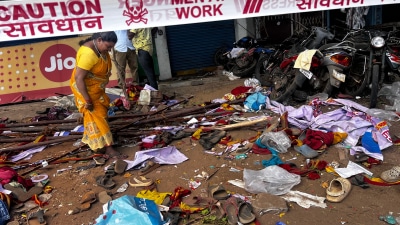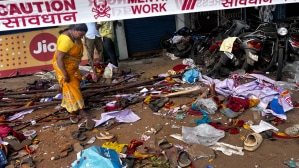Afghan refugees face cold, hunger in Pakistan camp
JALLOZAI, PAKISTAN, JAN 21: Anar Gul, an elegantAfghan woman, had no breakfast on a frosty January morning at the sprawling Jallozai camp ...

JALLOZAI, PAKISTAN, JAN 21: Anar Gul, an elegantAfghan woman, had no breakfast on a frosty January morning at the sprawling Jallozai camp in Pakistan. Nor did her five children.
The hearth was cold and so was the Air at 11 a.M. Afterfreezing overnight temperatures at the makeshift U.N.-run tent city that hosts thousands of refugees from Afghanistan.
They are the latest victims of a merciless 20-year-old war,the worst drought in 30 years, and a ruined economy.
"Where is the bread?" Gul said when asked if she had hadbreakfast. Balancing one child in each arm, Gul said her children had last had a few bites of bread the previous day.
Gul and her family fled Afghanistan hoping to find shelterin the refugee camps in Pakistan. But life is equally appalling at the Jallozai camp, which has no water or sanitation for the new arrivals.
Food, when available, is a piece of chapati (flatunleavened bread) and lentil soup. Tea, the most savoured hot drink in the freezing winter of the North West Frontier Province, is rare.
The tents are plastic sheets hung from three poles thatcannot stop the chilly winds slicing through.
Families huddle inside on the bare ground waiting fortransport from the United Nations High Commissioner for Refugees (UNHCR) to take them to a better camp.
Cold, disease and malnutrition have killed several childrenat the camp, how many, nobody appears to know. The UNHCR has appealed to donors to step up aid for the refugees.
The United Nations says renewed fighting in Septemberdisplaced more than 70,000 civilians from the northeast Takhar province, driving thousands of refugees into Pakistan.
U.N. estimates say that in recent months up to 60 Afghanfamilies entered Pakistan each day, most from the northern provinces of Takhar, Baghlan and Parwan.
Pakistan vowed to block new arrivals — it already hostsabout two million Afghans — but this resolve appears to have collapsed in the face of waves of fresh refugees arriving through the mountains.
FREEZING COLD
"Here we have problems. Last night we trembled and shiveredof cold as we have no blankets," Sher Ahmed, from Nahrin in the northern Afghan province of Baghlan, told Reuters.
"We have no food, no blanket, no shawl, no rice, no ghee(edible oil) to give to our children in order to survive. We do not even have a cup for tea," he said.
Thousands of people at the camp were in similar conditionand an exasperated U.N. staff could only struggle to keep them alive before their transfer to improved facilities.
"Jallozai is a makeshift site. It is an open place. Peopleare exposed to the freezing weather. There is no proper shelter, no sanitation or (clean) water facilities," said Yusuf Hassan, UNHCR’s senior regional external affairs officer for the southwest and central Asian region.
RACE AGAINST TIME
U.N. staff are racing to shift refugees to Shamshatu camp,about 30 km (19 miles) away, where there is better shelter and food arranged by the World Food Programme (WFP).
Women head at least 10 percent of the newly arrivingfamilies and cases of malnutrition among children have been reported.
The WFP said on January 11 it would help feed 60,000 newlyarrived Afghan refugees in Pakistan in 2001, more than double the number it was helping six months ago.
The organisation is already providing monthly food rationsto about 57,000 refugees in two camps near Peshawar and under this new operation it plans to continue feeding them for up to another 12 months.
Some refugees have been living at the Jallozai camp forthree months. But new refugees arrive each day and the UN expects up to 40,000 more over the next three months.
"I came here on January 6. I have nothing, am destroyed andwithout money," said Qurban Murad, who hails from the Imam Sahib district of Kunduz province bordering Tajikistan.
"We hoped that we would be helped in Jallozai camp," saidMuad, who accompanied 50 Turkmen families to Pakistan from the North of Afghanistan.
"Since Saturday I look up at the sky and look at the sunand start crying as I have nothing and feel helpless," he said.






- 01
- 02
- 03
- 04
- 05

























